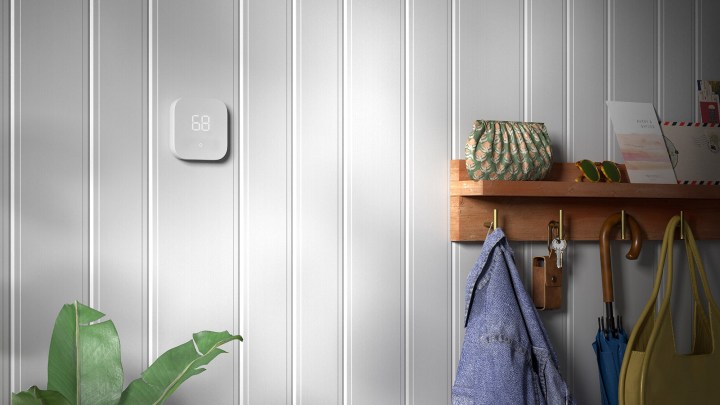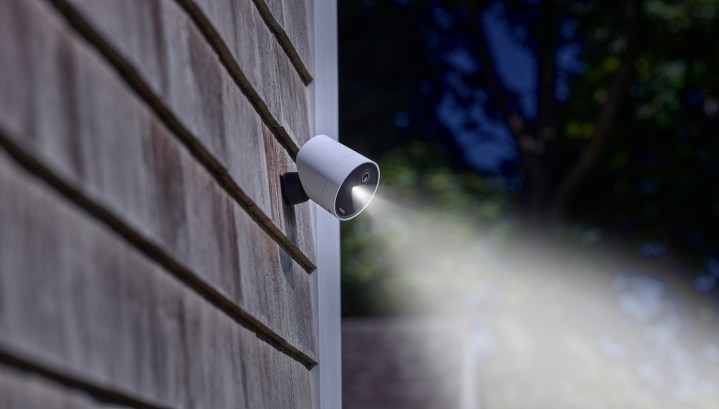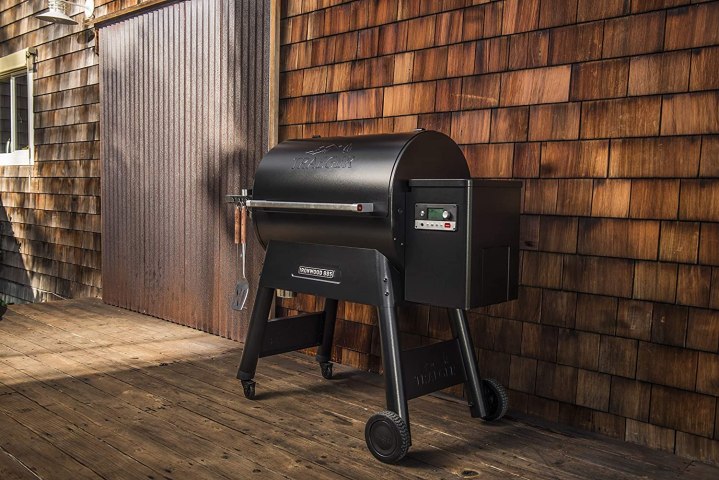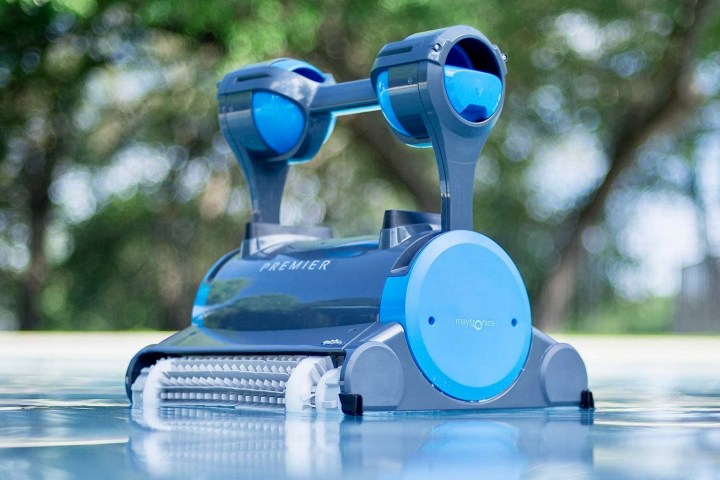Glorious summertime. Those three to four months of the year when the beach is a constant destination, the kids are free to roam, and your residence becomes the key spot for all your friends and family to hang out. And what better way to amaze your familiars, and build security and efficiency into your life, than with a range of smart home automations?
Whether you’re building routines with Alexa and Google Assistant or creating scenes with Apple HomeKit, these if-this-then-that commands are designed to group and simplify a set of smart home actions into one executable — such as a voice prompt, time of day, or intuitive geofencing that automatically adjusts your thermostat when you leave for work.
With summer fun and safety as our prevailing theme, we’ve put together this list of the best summertime routines that you can program into your smart home ecosystem, with recommended products and setup tips for each category.
Beat the heat (and manage your electricity)
There’s never a more sore reminder that it’s the middle of August than the electric bill you’re going to receive in September. Look, we get it, there’s no way you’re not going to keep the house as cool as possible during a heatwave, but there are ways you can manage how much energy your HVAC and window ACs are using, and all your smart home gear is here to help. Now first and foremost, let’s think about some of the smart products you’ll need.

What smart home devices do you need?
When it comes to energy monitoring, one of the most intelligent and intuitive devices you can invest in is a smart thermostat. Available from brands like Amazon, Google, and a host of other reliable names, most web-connected thermostats allow you to instantly adjust the temperature of your AC with your phone, tablet, or voice assistant, create schedules based on time of day, weather conditions, and work schedules, and even monitor the ins and outs of your home’s energy consumption.
But what if you don’t have central air? In that case, we’re guessing you’ll be running one or more window ACs, which means one of two things: You can either invest in an air conditioner with Wi-Fi connectivity, or if that’s not in the budget, you can grab yourself a set of smart plugs.
In terms of the former option, Wi-Fi-ready air conditioners, like this model from LG, can be controlled with an app or voice assistant, allowing you to power on/off your AC, adjust the temperature, change fan settings, and more. And if you need to think thrifty, a set of smart plugs can be just as handy.
For less than $30, this Amazon plug can be managed through the Alexa app or an Echo device, allowing you to toggle power and create on/off schedules for whatever devices you choose to connect.
What routines can you create?
Whether you’re operating an HVAC system or running a bunch of window units, the idea behind automating your air conditioning is to reduce overall energy consumption. And how can we tackle this challenge with routines?
For starters, you could create a stream of smart home actions built around your daily schedule. In this example, we’ll use Alexa as our go-to assistant. Now let’s say you’re normally away from home during the traditional 9-to-5 work window. Using the Routines builder in the Alexa app, you can have your smart thermostat raise the temperature to something less hospitable (maybe 77 or 78 degrees) when you leave for the day, and when you’re on your way home, you can have a second routine kick in at 5:00 p.m. to start lowering the temperature into the 72-degree range.
Let Alexa turn the AC up while you’re away from home to cut down on your energy bill.
No central air? No problem! As long as your smart window AC can be paired with Alexa, or you’re using a compatible smart plug, you’ll be able to similarly schedule routines that either keep your window unit at certain temperatures throughout the day or turn your air conditioners on or off based on when you leave and arrive.
And if you want to be really savvy, you can even set up geofencing automations through the Alexa app. Requiring a little more on the permissions end, geofencing will turn your phone into an Alexa-powered GPS tracker, allowing a number of routines to trigger when you leave the house and the workplace.
Many smart thermostats allow you to create automation directly in their first-party smartphone app. For example, you can create a schedule that kicks off your air conditioner a few minutes before you regularly leave for work, maintains your home at 77 degrees, then ramps back up on your commute home — ensuring it’s a cool 70 degrees when you step through the door.
Best of all, there’s no special programming required for this. Just open your app, then find the menu that lets you manually adjust your thermostat’s schedule. That means even if you’re not interested in working with Alexa, Google Home, or HomeKit, you can still benefit from various smart thermostat automations.
Bonus tip: Alongside or separate from your air conditioning, another great way to automate the temperature in your home is with a set of smart blinds (and yes, you can build routines for these, too).
Batten down the vacation hatches
You’ve been waiting months and months to ditch your humdrum range of responsibilities in favor of the seven days you’ve booked at some far-off tropical haven, with or without your kin. But who’s going to keep an eye on the homestead while you’re away? And what about all the dust that’s going to start piling up?
Fear not, aspiring vacationer: There are a number of smart home devices and routines you can create to build at-home security into your next much-needed getaway.

What smart home devices do you need?
DIY smart security is all the rage these days, with numerous brands producing a range of watchdog peripherals, from security cameras to motion-triggered sensors and floodlights, that can be paired to your Wi-Fi and controlled and customized through an app or voice assistant. And whenever you decide to hit the road, smart security will keep your precious domicile under lock and key.
Sure, you can invest in an all-out security suite from the likes of Ring or SimpliSafe. And if you’ve got the money to spend, we would actually recommend doing so. Month to month, you’ll end up paying a subscription charge based on the type of professional monitoring and additional features you want your smart security system to be capable of, but nothing says “peace of mind” like 24/7 SimpliSafe monitoring and on-call emergency services when the smoke alarm goes off, or your outdoor cam zeroes in on a package thief.
For those who don’t want to pay for a monthly or yearly membership, there are a number of standalone security systems and products to help you keep an eye on your property.
But for those who don’t want to pay for a monthly or yearly membership, there are a number of standalone security systems and products to help you keep an eye on your property. From smart cameras by Arlo and Wyze to automated locks and video doorbells from the likes of August and Lockly, these Wi-Fi-powered devices give you plenty of ways to see what’s going on back at your address, and can alert you when a subject crosses a pre-programmed motion threshold. Even smart speakers like the Echo Dot and Nest Mini have features like Alexa Guard (free) and Nest Aware (not free), that, when enabled, allow your speaker to listen for the sounds of glass breaking and sirens, pinging you and the authorities as needed.
And as far as keeping up with the dog and cat hair while you’re away, a robot vacuum is going to be your best friend. Bots from iRoomba and Roborock use powerful sensors and onboard cameras to tackle every nook and cranny of your home while being smart enough to return to the charging dock when the battery is low and avoid collisions with your furniture.
Best of all: There are a number of robot vacuums that allow you to tap into the vac’s navigation camera, giving you a live feed of your home through the bot’s companion app. In many cases, you’ll even be able to use two-way chat to converse with (and/or confuse) your pets.
What routines can you create?
Let’s shift our focus to Google Assistant and work our way through some of the “away for vacation” routines you can create to keep your crib safe, secure, and clean while you’re sipping adult beverages at Epcot. And vacationing is all about being away for a decent stretch of time, so while you can probably get away with one big routine for arming your smart security, a vacuuming schedule will work best as its own set of automations.
That being said, you can use your Google Assistant app to create a master routine that incorporates security cameras, sensors, locks, and even smart lighting. When activated, all of your security products become armed, and you can even program your smart lights to power on and off throughout the day to fool would-be malcontents into thinking you’re actually home. And similar to Alexa, you’ll be able to use Google Assistant’s geofencing capabilities to trigger a number of these routines without much programming.
In terms of your robot vac, you can either create a custom schedule through your vac’s companion app or use Google Assistant to set the bot on its every-other-day cleaning course.
And remember those smart thermostats and plugs we discussed up above? You can get really fancy about the quality of your home’s air by creating a routine to automate the temperature range based on the time of day, as well as power toggling for the smart plug your air purifier is plugged into.
Become a legend at your next BBQ
The music is lively, the food is amazing, and the company you keep considers you to be, quite simply, the best. Many of us dream about throwing a giant summertime shindig, complete with pool time and good eats, but what exactly can you do to go above and beyond the traditional gathering?
The answer: drop a small chunk of change on a couple of smart home products that will enrich your next get-together.

What smart home devices do you need?
Barbecues, pool parties, and Midsommar-inspired sacrificial festivities (we’re kidding, of course) all call for some elevated entertainment. And how exactly can you dazzle your guests? For starters, you could invest in some kind of outdoor audio system to crank out the jams.
A wired speaker system is going to involve the biggest upfront cost, both in terms of products and labor, but the results will be astounding. Not to mention that if the AV receiver you’re using to amp those speakers is web-connectable, you’ll be able to create automations that trigger certain playlists, choose audio sources, and play your favorite tunes at a pre-determined volume.
For those of us that can’t afford the splurge of an all-out speaker package, a wireless speaker can be just as effective. Brands like Sonos can be controlled with a few different voice assistants, and if you’ve got a set of outdoor smart lights, you can even build a routine that will change the color of the bulbs based on the type of music you’re listening to.
Last, but certainly not least, is the chef. Believe it or not, cooking savory ribs can be automated, too, thanks to smart grills and smokers.
What routines can you create?
Alas, let’s get the party started. Shifting our focus to the world of Apple HomeKit and Siri commands, let’s build some “scenes” (Apple’s version of routines) for our outdoor music.
For those of us with a wired A/V system, let’s say you want your speakers to lead the charge at your next pool party. To do so, you can use the Home app to create a scene powered by a single voice command like “pool party” that, when spoken to Siri or a HomePod, will power on your receiver and set it to the correct input and volume (in most cases).
Not too shabby. Now let’s address the Wi-Fi-speaker owners of our readership. Rocking a set of portable Sonos speakers? Go ahead and create a “pool party” scene that automatically pings one summertime Spotify playlist to all of your home’s Sonos peripherals. Or, better yet, you can add outdoor smart lights to this same routine. After all, who doesn’t want to see a cozy shade of blue when vibing out to Hotel California?
And as a bonus, if you’re using a HomePod mini, your iOS partygoers will also be able to “cast” audio from their devices to your smart speaker (as long as they have access to your Wi-Fi network).
Do you always use the same settings for your tried and true ribs recipe? Try building a scene that turns the smart smoker on and sets it to the appropriate temp for that perfect BBQ session. Do note that smart grills are part of a more finicky lineup of web-connected devices, so your model may only be compatible with certain voice assistants and routines (or scenes). In terms of what assistant will work best, Alexa is probably your safest bet.
Automate your home and yard chores
When the sun is burning bright, the last thing anyone wants to do is cut the grass or clean the pool. Fortunately, as this article would lead you to believe, you can use a number of smart home products and routines to automate your curb appeal or pH level. And if you’d rather be outside in the sun than inside vacuuming, you’ll be glad to know there’s automation for that, too.

What smart home devices do you need?
Smart lawnmowers and pool vacuums are still a bit niche and luxurious when it comes to smart home gadgets, but these lesser-sought devices can pack quite the punch. Robot vacuums are increasingly common, and they come with plenty of cool ways to automate their performance.
Over on the mower end of things, brands like Husqvarna make mowers that can be controlled and automated with Alexa. Additional features like low-decibel operation and blade adjustments allow you to fine-tune the type of trim your acreage will receive, and once the battery gets low, the mower will return to its charging dock — just like a robot vacuum!
Web-connected pool vacuums are pretty great, too. You won’t find as many of these gadgets on the market, but models like the Polaris 9650IQ can be powered, steered, and scheduled using the vac’s companion app and Alexa.
What routines can you create?
Simple routines are likely your best bet for smart mowers and pool vacs, and to bring this piece to a close, let’s return to Alexa once more.
Using the Alexa app, you can set up a “mow the lawn” routine that kicks into action when you speak those very three words. That’s cool, but what about geofencing? Well in terms of lawn-mowing, it may not be the best idea to run the mower while you’re away, but that doesn’t mean you can’t build a set of automations that power the mower once a week, while you’re at home, and only for a two-hour period.
And for our pool vacuum owners, you can build similar routines that create scheduled cleanings for your above- or in-ground pool. But like a smart mower, it’s best to run your vac when you’re actually near the pool, just in case something goes haywire.
If you own a robot vacuum, you’ve probably already set it up to automatically clean your home. But if you haven’t, consider this your call to action. Most products let you create a daily cleaning routine that compliments your busy schedule. A good way to do this is by running your robot vacuum at its highest setting while you’re at work, then performing smaller cleanings on the weekend at a lower power setting. All of this can be programmed using the accompanying smartphone app — making it easy to tinker with the settings until you find something that works for you.
Editors’ Recommendations
Services Marketplace – Listings, Bookings & Reviews